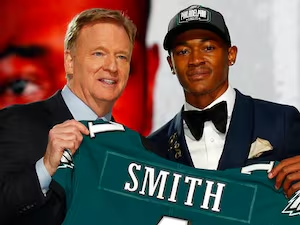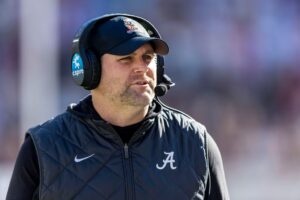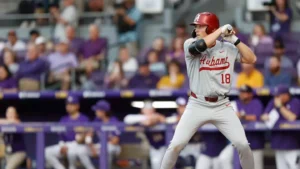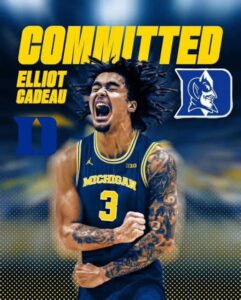
Hugh Freeze Speaks Out on Nico Iamaleava Saga: “Our Game Needs Some Change for Sure”
Auburn head football coach Hugh Freeze has never been one to bite his tongue, and that certainly didn’t change when he was asked about the ongoing saga surrounding former Tennessee quarterback Nico Iamaleava. As one of the highest-profile recruits in recent college football memory, Iamaleava’s sudden departure from the Volunteers program has sparked an industry-wide discussion on player movement, NIL (Name, Image, and Likeness), and the evolving structure of the college game. When Freeze was asked to weigh in, he didn’t hold back.
“Our game needs some change for sure,” Freeze said during a media session earlier this week. “There’s just too much instability, too much unpredictability. And when you see a situation like Nico’s, it kind of brings all those cracks into the spotlight.”
Iamaleava, a former five-star recruit and one of the crown jewels of Tennessee’s 2023 signing class, had long been considered the future of the program. After backing up Joe Milton for most of his freshman year, he stepped into the starting role with high expectations entering 2024. But just one year into his reign, reports began to swirl that Iamaleava was eyeing a transfer. Days later, the news became official: he was entering the portal, and Tennessee’s plans were suddenly in flux.
To Freeze, who is building a program at Auburn that hopes to challenge the likes of Alabama and Georgia in the SEC West, the incident served as a cautionary tale about where college football may be heading.
“You put your heart and soul into building a program, building relationships, developing young men, and then all of a sudden, something shifts—sometimes it’s money, sometimes it’s pressure, sometimes it’s just confusion—and a player like Nico is gone,” Freeze explained. “That’s hard on a program. It’s hard on the fans. And honestly, it’s hard on the player too.”
Freeze is no stranger to college football’s changing landscape. He’s navigated the ups and downs of the transfer portal, he’s recruited in the NIL era, and he’s seen firsthand how quickly rosters can change. But while he supports player empowerment and believes in athletes getting their due, Freeze believes the pendulum may have swung too far in one direction.
“I want our guys to succeed. I want them to be taken care of. I want them to have opportunities,” he said. “But right now, the way things are, it feels like we’ve lost the middle ground. There’s got to be a way to balance player freedom with team stability. And right now, I don’t think we’ve figured that out.”
Freeze’s comments struck a chord with coaches across the country. Behind closed doors, many share his sentiment, but few are as willing to say it publicly. The combination of unrestricted transfers and a wide-open NIL market has created an environment that can feel more like free agency than college athletics. And for coaches like Freeze who are trying to build long-term cultures, the constant churn poses a significant challenge.
“You can’t build anything lasting if you’re starting over every year,” Freeze said. “And for fans, for alumni, for the guys in the locker room—it becomes exhausting. You’re trying to follow a team, trying to invest emotionally, and then the core of that team is gone by the next fall.”
Iamaleava’s exit from Tennessee wasn’t just about football. It raised questions about what promises were made during recruiting, what expectations were set, and how much influence outside forces—collectives, agents, media—had on the decision. Freeze didn’t address those specifics, but he hinted at the broader implications.
“There’s a lot of people around these kids now. Some of them have their best interests at heart. Some of them don’t,” he said. “And it’s hard to tell the difference sometimes. I feel for coaches who do everything right and still lose their guy. I feel for players who get bad advice. And I feel for college football fans who are watching something they love turn into something they barely recognize.”
Still, Freeze isn’t pessimistic about the future. In fact, he believes that moments like this—difficult as they are—can serve as turning points for reform.
“Sometimes you need a little chaos to force people to sit down and talk about solutions,” he said. “Maybe what happened with Nico will be that catalyst. I hope it is. Because if we keep going down this road without some changes, I think we’re going to lose something really important about college football.”
Asked what kind of reforms he would support, Freeze offered a few ideas.
“Number one, we need uniformity in how NIL is structured and disclosed. Right now, it’s the Wild West. Every state’s different, every school’s different. That’s not sustainable. Number two, I think we’ve got to consider a transfer window that actually means something. Not just a window for entry, but one that limits movement unless certain criteria are met. And number three, I’d love to see more investment in education—real education—for players and families about how this all works. Financial literacy, legal advice, long-term planning. That’s where we’re failing these young men.”
Freeze’s perspective comes from experience. He’s seen talented players leave Auburn before their potential was fully realized. He’s recruited athletes who have been swayed by late offers or lucrative deals from other programs. And through it all, he’s tried to keep his program grounded in relationships and responsibility.
“What I tell my guys is this: make decisions with your heart, not your wallet. Make them with your future in mind, not just your present. And surround yourself with people who care more about your character than your clout,” Freeze said.
Whether that message still resonates in today’s landscape is a question Freeze admits he wrestles with daily.
“It’s hard. I’m not gonna lie. You try to do it the right way, and sometimes you still get burned. But that doesn’t mean you stop trying. That doesn’t mean you throw your hands up. It just means you keep fighting for what you believe in, even when the system feels broken.”
As the 2025 season approaches, Freeze is focused on Auburn. His team returns several key contributors, and the Tigers’ recruiting class is among the most promising in recent years. But he knows that stability is fleeting. In a world where players can leave at a moment’s notice—and sometimes do—the job of a head coach is more complex than ever.
“I’m still here to win games,” Freeze said. “But I’m also here to mentor young men, to give them something solid in a world that feels shaky. That’s what keeps me going.”
And when asked whether he believes college football can survive this period of upheaval and emerge stronger, Freeze didn’t hesitate.
“Absolutely. But it’s going to take courage. From coaches, from administrators, from the NCAA, and yes—from the players too. We’ve got to come together and figure this out. Because the game is worth saving. The traditions, the rivalries, the passion—none of that should be lost because we couldn’t adapt the right way.”
In a year where college football seems to be rewriting its own rulebook every month, Hugh Freeze’s words serve as both a warning and a call to action. The saga of Nico Iamaleava may be just one chapter in a much larger story, but it’s a chapter that has left a lasting impression on one of the sport’s most passionate voices.
And in Freeze’s view, that might just be what it takes to start writing a better ending.





